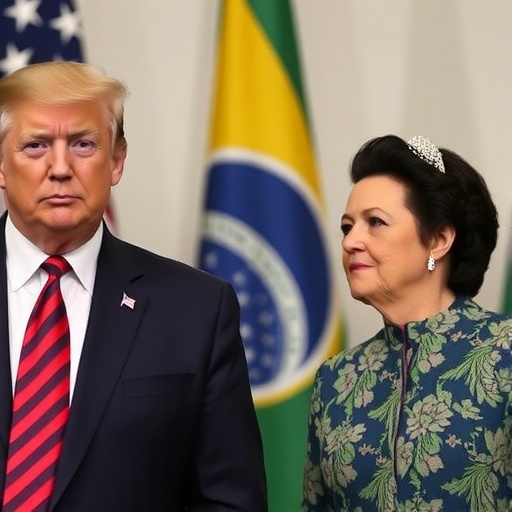Trump and Brazil’s Lula Kick Off Immediate Tariff Negotiations in Surprise Diplomatic Thaw
In a stunning pivot from years of trade friction, President Donald Trump and Brazilian President Luiz Inácio Lula da Silva have agreed to launch immediate negotiations to resolve escalating tariff disputes, with Trump hinting at tariff reductions if Brazil shows leniency toward former President Jair Bolsonaro’s legal woes. The announcement, made during a virtual summit on Wednesday, marks a potential turning point in U.S.-Brazil relations, blending economic incentives with political maneuvering.
The talks come at a critical juncture, as U.S. tariffs on Brazilian steel and aluminum—imposed during Trump’s first term—continue to strain bilateral trade worth over $100 billion annually. Sources close to the White House revealed that Trump personally initiated the call to Lula, emphasizing a desire to “reset the relationship” amid global economic pressures from inflation and supply chain disruptions.
“We’re ready to talk tariffs right now,” Trump stated in a post-summit tweet, adding, “Brazil has been a great partner, but we need fairness on trade—and on other matters too.” Lula, speaking from Brasília, echoed the sentiment: “Dialogue is the path to prosperity. We will address tariffs head-on while respecting our sovereignty.”
Escalating Trade Barriers Spark Urgent U.S.-Brazil Dialogue
The roots of the current tariff standoff trace back to 2018, when Trump invoked national security concerns to slap 25% tariffs on steel and 10% on aluminum imports from Brazil. These measures, aimed at protecting American industries, hit Brazil’s export-driven economy hard, costing the South American giant an estimated $2.5 billion in lost revenue between 2018 and 2022, according to Brazil’s Ministry of Economy.
Brazil retaliated with tariffs on U.S. goods like soybeans, aircraft, and whiskey, escalating a tit-for-tat cycle that has persisted despite temporary pauses during the Biden administration. Under Trump’s return to the White House in 2025, these tariffs were reinstated at full force, prompting Lula’s government to warn of further countermeasures. Last month, Brazil announced plans to impose duties on $1.2 billion worth of American products, including electric vehicles and pharmaceuticals, in direct response to Trump’s policies.
Industry experts note that these barriers have ripple effects far beyond borders. For instance, U.S. steel consumers, from automakers like Ford to construction firms, face higher costs—up 15% on average—while Brazilian miners like Vale S.A. report slumping profits. A recent report from the U.S. Chamber of Commerce highlighted that unresolved tariffs could shave 0.5% off Brazil’s GDP growth this year, exacerbating challenges from domestic inflation hovering at 4.8%.
During the summit, both leaders acknowledged these pain points. Lula pushed for a phased removal of tariffs, citing Brazil’s compliance with WTO rules, while Trump countered with demands for stricter intellectual property enforcement in Brazil’s agricultural sector. Negotiators from both sides are set to convene in Washington next week, with a focus on quota systems to balance trade flows.
Bolsonaro’s Shadow Looms Over Tariff Talks
At the heart of Trump’s overture lies a politically charged bargain: tariff relief in exchange for clemency toward Jair Bolsonaro, the far-right former president who has faced multiple investigations since leaving office in 2023. Bolsonaro, a Trump ally often dubbed the “Tropical Trump,” is embroiled in probes over alleged election interference, corruption, and his handling of the COVID-19 pandemic, which claimed over 700,000 lives in Brazil.
Brazilian authorities have charged Bolsonaro with inciting the January 2023 riots in Brasília, reminiscent of the U.S. Capitol attack, leading to his temporary exile in Florida. Trump has publicly defended him, calling the cases “witch hunts” and offering political asylum if needed. In private discussions, according to diplomatic leaks reported by Reuters, Trump suggested that easing pressures on Bolsonaro could pave the way for tariff concessions.
Lula, a leftist icon who narrowly defeated Bolsonaro in 2022, has vowed to uphold judicial independence. “No one is above the law,” Lula affirmed in a press briefing, but he stopped short of ruling out backchannel diplomacy. Brazilian legal experts, including former Supreme Court Justice Gilmar Mendes, warn that any perceived interference could ignite domestic protests, with Bolsonaro’s supporters—still a potent force numbering in the millions—rallying under the banner of “Liberty Brazil.”
Polls from Datafolha indicate that 45% of Brazilians view Bolsonaro favorably, creating a delicate balancing act for Lula. Integrating this political dimension into trade talks risks alienating U.S. Democrats and human rights groups, who have criticized Trump’s interventions. Amnesty International issued a statement urging Brazil to resist external pressures, emphasizing that “trade should not trump justice.”
Trump’s Strategic Play: Linking Economics and Politics
President Trump’s willingness to tie tariffs to Bolsonaro’s fate underscores his signature blend of deal-making and realpolitik. Advisors in the Trump administration argue that supporting Bolsonaro aligns with broader goals of countering leftist influence in Latin America, especially as Lula strengthens ties with China—Brazil’s top trading partner, accounting for 30% of its exports.
Trump’s strategy isn’t new; during his first term, he used tariffs as leverage in negotiations with Mexico and Canada under the USMCA. Here, the stakes are higher: Brazil supplies 20% of U.S. steel imports and is a key player in the global coffee and soy markets. Reducing tariffs could lower U.S. manufacturing costs by up to 12%, per estimates from the Peterson Institute for International Economics, benefiting sectors like renewable energy where Brazilian aluminum is vital.
Yet, critics like Sen. Elizabeth Warren (D-MA) decry the approach as “extortionate,” warning it could destabilize democratic norms. In a Senate hearing last week, Warren stated, “Using American jobs as bargaining chips for authoritarian figures undermines our values.” On the Brazilian side, Economy Minister Fernando Haddad has signaled openness to compromises, noting that “pragmatism must guide us in turbulent times.”
Financial markets reacted positively to the news, with Brazil’s Bovespa index rising 2.3% and U.S. steel futures dipping slightly in anticipation of eased restrictions. Analysts from Goldman Sachs predict that a successful deal could boost bilateral trade by 15% within two years, injecting $15 billion into both economies.
Expert Insights on Resolving the Tariff Impasse
Trade scholars and economists are closely watching the negotiations, offering varied perspectives on potential outcomes. Dr. Monica de Bolle, a Brazil expert at Johns Hopkins University, told CNN, “Trump’s linkage of tariffs to Bolsonaro is risky but clever—it personalizes the diplomacy Lula can’t ignore.” She forecasts that initial talks could yield a temporary tariff suspension, pending WTO arbitration expected in Q3 2025.
From a Brazilian viewpoint, former Foreign Minister Celso Amorim emphasized reciprocity: “We won’t trade justice for steel prices, but we can find middle ground on market access.” Amorim, who served under Lula previously, highlighted Brazil’s recent reforms, including a 10% cut in industrial subsidies, as goodwill gestures.
Quantitative models from the World Bank suggest that full tariff elimination could create 50,000 jobs in Brazil’s export sector and stabilize U.S. prices for commodities amid global volatility. However, hurdles remain: environmental concerns, as Brazil’s Amazon deforestation rates—up 20% under Bolsonaro—clash with U.S. green initiatives, and currency fluctuations with the Brazilian real weakening 8% against the dollar this year.
Stakeholders from both nations are mobilizing. The American Iron and Steel Institute lobbied for protections, while Brazil’s steel lobby, Inda, urged swift action. Virtual roundtables planned for next month will include business leaders like Boeing’s CEO, whose company relies on Brazilian titanium for aircraft production.
Future Pathways: Trade Revival and Regional Stability
As negotiators gear up, the immediate talks signal a broader recalibration of U.S.-Latin America relations. Success could extend to collaborations on climate change, with Brazil hosting the 2025 UN conference and Trump eyeing biofuels from Brazilian ethanol to meet domestic energy demands.
Failure, however, risks escalation: Brazil has threatened to diversify exports toward the EU, which recently inked a landmark trade pact with Mercosur. For Trump, alienating Lula might push Brazil deeper into China’s orbit, complicating U.S. strategies in the hemisphere.
Looking ahead, experts anticipate phased agreements—starting with tariff quotas on steel by mid-2025—while Bolsonaro’s case proceeds independently in Brazilian courts. Diplomatic observers in Brasília and Washington believe this hybrid approach could foster long-term stability, potentially inspiring similar deals with Argentina and Colombia.
In the words of international relations professor Oliver Stuenkel, “This is diplomacy at its most intricate: weaving economics, politics, and personal alliances into a tapestry of mutual benefit.” As the world watches, the Trump-Lula summit underscores that in global trade, no deal is ever just about numbers—it’s about narratives, loyalties, and the delicate dance of power.








